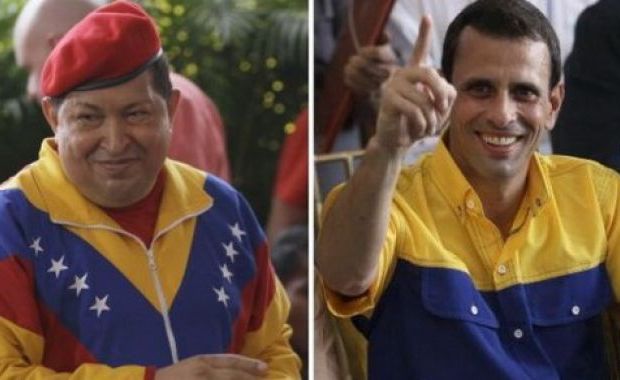
Venezuelan voters are set to go to the polls in what is predicted to be the country’s most tightly contested presidential election in a decade.
Left-wing incumbent Hugo Chavez, first elected in 1999, is being challenged by opposition leader Henrique Capriles.
Hugo Chavez wants to continue what he calls his socialist revolution while Henrique Capriles has promised to restore economic growth.
Almost 19 million Venezuelans are eligible to vote in the election.
Hugo Chavez – who is seeking a fourth term in office – was diagnosed with cancer last year but says he has now fully recovered.
A colorful and often controversial figure on the international stage, President Hugo Chavez, 58, has nationalized key sectors of the economy.
Venezuela is a major oil producer and high oil prices over the past decade have allowed his government to fund health-care, education programmes and social housing.
He says he needs another term to complete his “Bolivarian Revolution” towards socialism.
However, Henrique Capriles, 40, and the opposition say the president’s policies have led to bureaucracy, inefficiency, and shortages.
They also accuse Hugo Chavez of authoritarianism and of suppressing the judiciary and silencing critics in the media.
Henrique Capriles says a lack of investment in Venezuela’s crucial oil industry has led to a decline in production.
Both candidates held huge final rallies on Thursday – the last day of campaigning.
The two candidates have also used social media to encourage voters to cast their ballots.
“Good morning to all, one day left to open the door to the future!” Henrique Capriles wrote on his Twitter account on Saturday.
“Comrades across the world: Be assured that Bolivar’s people will continue to work to make another world possible, that is, a socialist one!” President Hugo Chavez tweeted.
Almost 140,000 soldiers will be deployed to guard more than 10,000 voting centres.
A week before the election, three opposition activists were killed during a campaign rally, and four people were injured in a shooting during a voting rehearsal in September.
From Saturday evening to Monday evening, the sale of alcohol is banned and only the security forces will be allowed to carry arms.
National Electoral Council official Socorro Hernandez said that everything would be “100% ready for polling day”.
She called on all parties and non-governmental groups to contribute to a peaceful election “and avoid any distortions”.
While polls are scheduled to close at 18:00 local time, National Electoral Council President Tibisay Lucena said that the hours could be extended if voters were still queuing to cast their ballots.